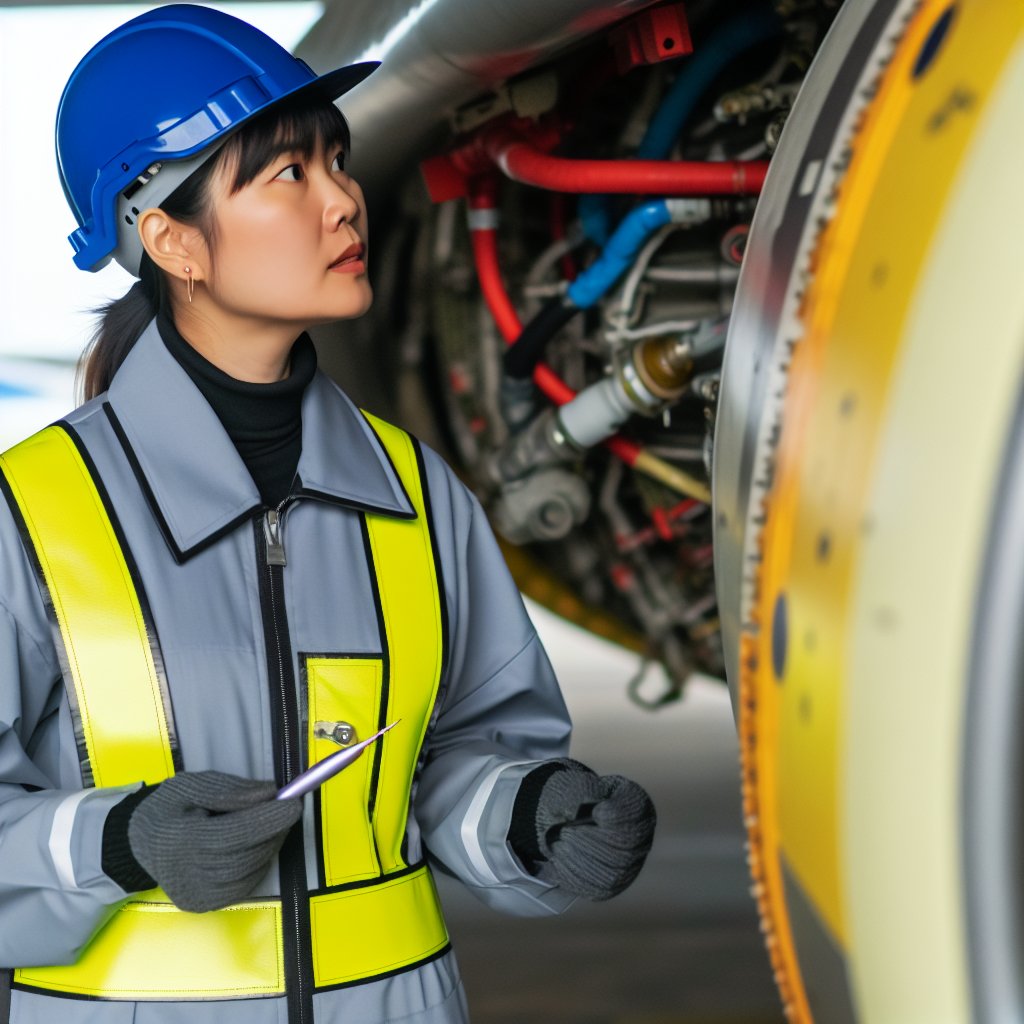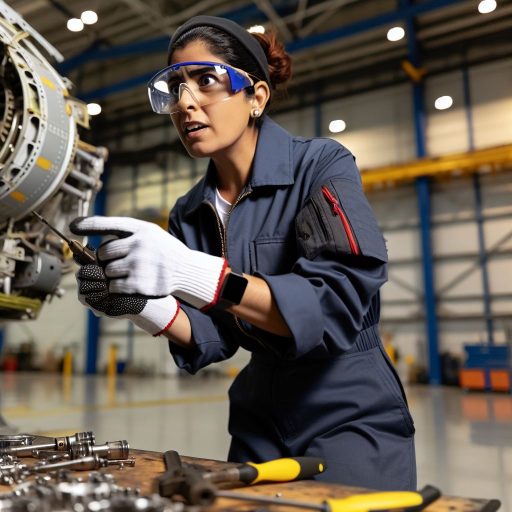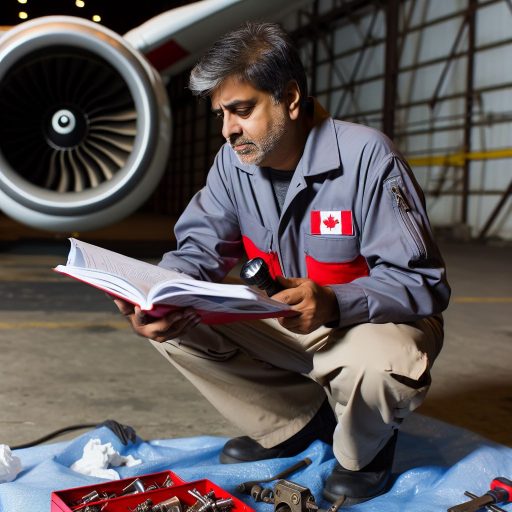Attention to Detail
Significance of Small Components
Attention to detail is crucial for aviation maintenance technicians.
Small components can greatly impact aircraft safety.
Each part plays a role in the overall system functionality.
Neglecting minor issues can lead to severe consequences.
For instance, a loose bolt may result in malfunction.
Impact on Aircraft Safety
Every technician needs to understand safety regulations.
Federal Aviation Administration sets strict guidelines.
Following these can minimize the risks associated with maintenance.
Thorough inspections ensure that nothing is overlooked.
Furthermore, technicians should document their findings accurately.
Importance of Checklists
Utilizing checklists reinforces attention to detail.
Checklists ensure consistency in maintenance procedures.
Every step should be carefully checked and verified.
In addition, they help in training new technicians effectively.
A thorough checklist can prevent oversights during inspections.
Continuous Learning and Development
Aviation maintenance technicians must embrace ongoing education.
New technologies and regulations emerge regularly.
Staying updated enhances a technician’s ability to ensure safety.
Moreover, attending workshops can refine technical skills.
Networking with peers can provide valuable insights and best practices.
Technical Proficiency
Mastery of Aviation Systems
A great aviation maintenance technician must understand complex aviation systems.
This includes knowledge of engines, avionics, and airframe components.
Having a strong grasp of these systems ensures safe and effective maintenance.
Familiarity with Tools
Proficient technicians are skilled in using specialized aviation tools.
They must know how to operate diagnostic equipment and hand tools effectively.
Unlock Your Career Potential
Visualize a clear path to success with our tailored Career Consulting service. Personalized insights in just 1-3 days.
Get StartedMoreover, their familiarity with technologies enhances their repair capabilities.
Repair Methods
Expertise in various repair methods is vital for aviation maintenance technicians.
Technicians should be adept in both preventive and corrective maintenance practices.
They must understand industry best practices and safety regulations.
Certification and Continuous Learning
Aviation maintenance technicians require certification from recognized bodies.
Continuous education keeps them updated with evolving technologies.
Participating in workshops and seminars promotes professional growth.
Problem-Solving Skills
Effective technicians possess strong problem-solving abilities.
They assess issues quickly and develop practical solutions.
This skill is invaluable for minimizing downtime and ensuring aircraft safety.
Attention to Detail
Attention to detail is crucial in aviation maintenance.
Even minor oversights can lead to significant issues.
Great technicians meticulously inspect components and follow procedures.
Problem-solving Skills
Importance of Diagnosing Issues
Problem-solving skills are crucial for an aviation maintenance technician.
These skills enable technicians to diagnose issues quickly.
Additionally, efficient problem-solving saves time and resources.
Techniques for Effective Diagnosis
Technicians often rely on systematic approaches for diagnosing problems.
They utilize checklists and diagnostic tools for accurate assessments.
Moreover, experience plays a significant role in problem identification.
Continuous Learning and Adaptation
Aviation technology evolves rapidly, requiring ongoing education.
Technicians benefit from attending training sessions and workshops.
Additionally, staying updated on industry standards is essential for success.
Collaboration with Team Members
Strong communication fosters teamwork in solving complex issues.
Technicians often consult with colleagues to gain new perspectives.
This collaboration enhances the overall efficiency of maintenance operations.
Discover More: The Journey to Becoming a Licensed Maritime Pilot
Strong Communication Abilities
Importance of Clear Communication
Clear communication is vital in aviation maintenance.
It ensures safety and efficiency in operations.
Moreover, it fosters teamwork among technicians.
Conveying Information Effectively
Aviation maintenance technicians regularly share critical information.
They must convey detailed findings to team members.
Furthermore, they communicate with other departments as needed.
Listening Skills
Effective communication also involves active listening.
Listening helps understand concerns from colleagues.
By doing so, technicians can address issues promptly.
Utilizing Technology for Communication
Today’s technicians use various technologies for communication.
Email and messaging platforms streamline information sharing.
Additionally, maintenance management systems provide real-time updates.
Training and Development
Continuous training enhances communication skills.
Workshops can improve both verbal and written communication.
Engaging in team-building exercises fosters better relationships.
Delve into the Subject: Understanding the Responsibilities of a Maritime Pilot
Adaptability
Flexibility in Various Environments
Adaptability is crucial for an aviation maintenance technician.
This role often requires working in diverse environments.
Technicians must adjust to hangars, runways, and offices seamlessly.
Each location may present unique challenges and tools.
Flexibility in these settings enhances overall efficiency.
Embracing New Technologies
The aviation industry constantly evolves with new technologies.
Technicians must stay informed and adaptable to these changes.
Learning new software or equipment ensures they remain relevant.
Being open to innovation fosters skill development.
Moreover, it improves safety and operational effectiveness.
Continuous Learning
Continuous learning is essential for aviation maintenance technicians.
Attending workshops and training sessions provides updates on best practices.
This pursuit of knowledge helps technicians manage complex issues.
Additionally, certifications demonstrate competence and commitment.
Ultimately, a dedication to learning supports career advancement.
See Related Content: Tools Every Aviation Maintenance Technician Needs

Collaboration and Teamwork
Effective Communication
Clear communication is vital in aviation maintenance.
It ensures that everyone is on the same page.
Regular updates prevent misunderstandings among team members.
Technicians must clearly explain issues to engineers and pilots.
Moreover, they should not hesitate to ask questions.
Building Trust
Trust fosters collaboration in aviation maintenance teams.
Each member must rely on others’ skills and knowledge.
Trust takes time to develop, but it pays off immensely.
As technicians establish trust, teamwork naturally improves.
Contributing positively enhances the overall working environment.
Problem-Solving as a Team
Aviation maintenance often involves unexpected challenges.
Collaboration allows the team to brainstorm effective solutions.
Group discussions can yield innovative ideas and approaches.
Each individual brings unique perspective and expertise.
Harnessing these diverse viewpoints leads to better outcomes.
Respect for Roles
Each team member has a specific role in aviation maintenance.
Respecting these roles enhances overall efficiency.
Technicians must understand the responsibilities of others.
This understanding promotes synergy and coordination.
Recognizing each member’s contributions fosters a positive dynamic.
Building Relationships with External Teams
Interaction with engineers and pilots is essential.
Technicians should establish rapport with these professionals.
Effective collaboration improves the maintenance process.
Understanding pilot expectations aids in prioritizing tasks.
Additionally, engineers can provide valuable technical insights.
Find Out More: Freight Forwarder Career Pathways And Opportunities
Commitment to Safety
Aviation maintenance technicians prioritize safety in all their tasks.
They adhere strictly to safety protocols and regulations.
This commitment starts with understanding the importance of safety.
Additionally, they stay updated on the latest safety standards.
Regular training helps them remain knowledgeable about safety procedures.
Utilizing Proper Safety Gear
Technicians must wear appropriate personal protective equipment (PPE).
This equipment includes gloves, goggles, and safety shoes.
Using proper safety gear minimizes risks during maintenance tasks.
Conducting Thorough Inspections
Regular inspections of aircraft and tools are essential.
These inspections help identify potential hazards early on.
Moreover, addressing issues promptly can prevent accidents.
Following Established Maintenance Procedures
Every technician must follow established maintenance guidelines.
These guidelines provide a structured approach to safety.
Following them helps ensure consistent and safe practices.
Fostering a Safety Culture
A strong safety culture promotes awareness among technicians.
It encourages open discussions regarding safety concerns.
Furthermore, sharing experiences helps reinforce the importance of safety.
Continuous Learning
Importance of Staying Current
Continuous learning is vital for aviation maintenance technicians.
The aviation industry evolves rapidly with new technologies.
Technicians must keep pace to ensure safety and efficiency.
Regularly updating skills helps technicians remain relevant.
Keeping Up with New Technologies
Technological advancements significantly impact the aviation sector.
Understanding digital tools is essential for modern technicians.
For instance, avionics systems are increasingly computerized.
Technicians must learn to troubleshoot these complex systems.
Additionally, familiarization with software updates is crucial.
Certifications and Training
Obtaining certifications can enhance career opportunities.
Various organizations offer specialized training programs.
Technicians should pursue certifications relevant to their roles.
For example, the FAA provides guidelines for mandatory training.
Furthermore, continuous education keeps knowledge current.
Engaging with Industry Advancements
Networking with industry professionals fosters shared knowledge.
Attending conferences and workshops is greatly beneficial.
Technicians can learn about cutting-edge developments firsthand.
Moreover, engaging with peers encourages a culture of growth.
Many resources, such as webinars, are available online.
Self-Motivation and Initiative
Successful technicians often display self-motivation and initiative.
Actively seeking out new learning opportunities is key.
Such drive can lead to advanced skill sets and promotions.
Keeping a personal learning plan can aid in this effort.
Setting specific goals enhances growth in the field.




